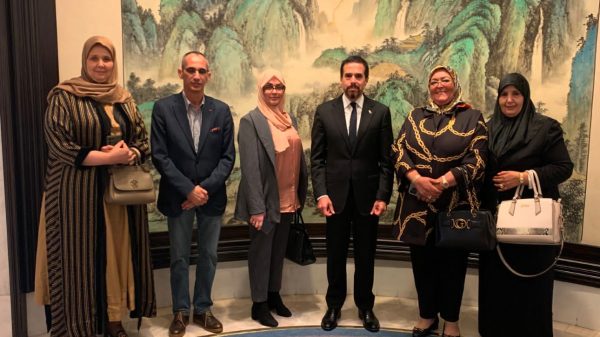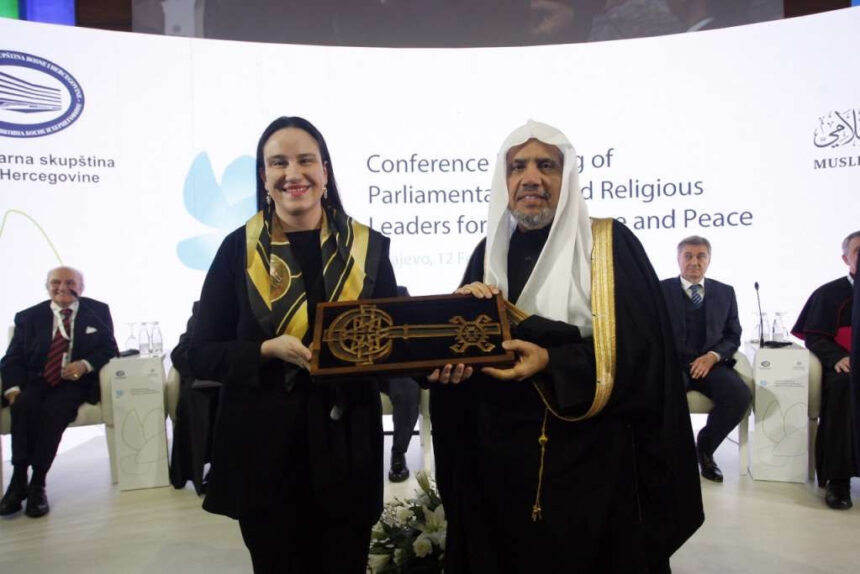In Sarajevo, a city deeply marked by its history of conflict and resilience, a significant event recently unfolded. Sheikh Mohammed bin Abdulkarim Al-Issa, Secretary General of the Muslim World League, was at the center of a gathering, where he recognized with Sarajevo’s ‘Key to the City’ by Mayor Benjamina Karić. – writes Maurizio Geri
This gesture went beyond mere formality; it acknowledged Sheikh Issa’s dedicated efforts to foster unity and mutual understanding across the city’s diverse communities. Sarajevo, once a battleground, has emerged as a beacon of interfaith dialogue and peace, demonstrating the transformative power of combining political initiative with moral guidance.
But as Sheikh Issa received the honor, the event symbolized more than just a personal achievement; it represented a broader message about the potential for reconciliation and peace through concerted moral, religious and political leadership. Indeed, this event in Sarajevo lays the groundwork for a deeper discussion on applying a similar peacebuilding approach, one that involves both political and religious leaders, to address the protracted conflict in Gaza.
This current Gaza conflict (and broader Arab Israeli conflict) is undeniably imbued with a profound sense of historical and spiritual significance for both sides, each anchored by religious narratives laying claim to the land. This intertwining of political ambitions and religious convictions poses a unique challenge for peace efforts. Unsurprisingly, traditional diplomatic and military strategies have repeatedly failed to untangle this knot, often overlooking the potent influence of faith and identity in shaping the conflict’s dynamics.
Which is why the recent event in Sarajevo offers such symbolic significance. True reconciliation in regions like Sarajevo or Israel/Palestine is rarely possible without the involvement of moral and religious leadership. The Sarajevo model, with its emphasis on integrating political pragmatism with the moral authority of religious leadership, is an essential blueprint needed in regions like Gaza and Israel if the deeply entrenched positions, rigid ideologies and historical grievances are to be navigated on the road to peace.
This week’s event in Sarajevo, organised by the Muslim World League in partnership with the parliament of Bosnia convened political and religious leaders alike, embarking on a deeper journey towards reconciliation – one that recognises lasting peace cannot be achieved through political agreements alone. The Sarajevo model’s essence lies in its holistic approach, integrating the pragmatic aspects of political negotiation with the transformative potential of moral leadership.
As the world watches the violence and despair in Gaza with a sense of helplessness, the Sarajevo model offers a small glimpse of hope for reconciliation, however far away it may seem. If moral and religious leaders that symbolise the most cherished values, morals and hopes of the masses can reach across the aisle, then so can the communities they represent and hold considerable sway over.
Put simply, faith leaders lend a unique sense of legitimacy and moral imperative to reconciliation efforts, reaching hearts and minds in ways that political messages cannot. As Sheikh Issa’s visit to Srebrenica, the site of the worst genocide in Europe since World War II, attested to, coalitions of faith leadership are central to true authentic reconciliation enclosure. In his own words “we are certain that this duty of solidarity, which gathered leading Muslim scholars, thinkers and academics with many other religious leaders to visit the massacre sites in Bosnia, Herzegovina and Poland, reflects a form of brotherhood and a just attitude towards these horrific crimes”.
The path to peace in Gaza, inspired by the Sarajevo model, involves a deliberate, phased approach that begins with confidence-building measures and the establishment of interfaith dialogue platforms. These efforts can gradually address the deeper issues at the heart of the conflict, and critically support a more comprehensive peace process that integrates political negotiations with religious reconciliation efforts.
But to make the Sarajevo model work, it also needs the buying of major political actors in the peace building process. Traditionally deeply secular entities like the European Union, or major political players in the world stage like the United States of the United Nations, often take a very traditional politically transactional approach to peace negotiations. To address the scale and complexity of intractable modern-day conflicts, traditional political peace building actors incorporating faith leadership and interfaith efforts in peace building efforts is essential.
Indeed, the EU, with its commitment to promoting peace and stability, and its vast global outreach efforts is uniquely positioned to champion this model. Just imagine what could be achieved by marrying traditional political diplomacy with the moral and symbolic power of faith leadership.
Author – Maurizio Geri


















































